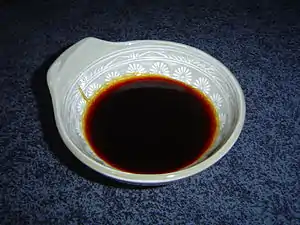Date honey
Date honey, date syrup, date molasses or rub (Arabic: رُب, pronounced [rubb]; Hebrew: סילן or סילאן, silan; Persian: شیره خرما) is a thick dark brown, very sweet fruit syrup extracted from dates. It is widely used in North African and Middle Eastern cooking.

Nutritional aspects
Date syrup is rich in the monosaccharides glucose and fructose,[1] and so most of its sugar content is absorbed into the bloodstream in the mouth, meaning that it raises the blood glucose levels more efficiently and immediately than other syrups. It is therefore highly suitable for people suffering from hypoglycaemia, or for those with sucrose intolerance or those with pancreatic problems who have difficulty absorbing disaccharides. Date syrup is higher in magnesium and potassium than some natural sweeteners such as maple syrup and honey and so has been a popular alternative to sugar in recent years.[2] It is also rich in antioxidants due to its high phenolic and flavonoid content[3][4][5] and has been shown to exhibit anti-inflammatory activity.[6][7]
In national cuisines
It is used widely in Libya, usually with asida, a porridge-like dessert.
In Iranian cuisine, date syrup is used to sweeten ardeh (tahini), consumed at breakfast. An alternative is grape syrup.
See also
References
- Bouhlali, Emiad dine Tariq; Derouich, Mgal; Meziani, Reda; Bourkhis, Boucha; Filali-Zegzouti, Younes; Alem, Chakib (2020). "Nutritional, mineral and organic acid composition of syrups produced from six Moroccan date fruit (Phoenix dactylifera L.) varieties". Journal of Food Composition and Analysis. 93: 1–8. doi:10.1016/j.jfca.2020.103591.
- "Date Lady Nutrition Information". Date Lady. Retrieved 2018-11-09.
- Abbès, Fatma; Kchaou, Wissal; Blecker, Christophe; Ongena, Marc; Lognay, Georges; Attia, Hamadi; Besbes, Souhail (2013). "Effect of processing conditions on phenolic compounds and antioxidant properties of date syrup". Industrial Crops and Products. 44: 634–642. doi:10.1016/j.indcrop.2012.09.008.
- Bouhlali, Emiad dine Tariq; Bammou, Mohamed; Sellam, Khalid; Benlyas, Mohamed; Alem, Chakib; Filali-Zegzouti, Younes (2016). "Evaluation of antioxidant, antihemolytic and antibacterial potential of six Moroccan date fruit (Phoenix dactylifera L.) varieties". Journal of King Saud University - Science. 28 (2): 136–142. doi:10.1016/j.jksus.2016.01.002.
- Taleb, Hajer; Maddocks, Sarah; Morris, Keith; Kanekanian, Ara (2016). "The Antibacterial Activity of Date Syrup Polyphenols against S. aureus and E. coli". Frontiers in Microbiology. 7 (198): 1–9. doi:10.3389/fmicb.2016.00198.
- Taleb, Hajer; Morris, Keith; Withycombe, Cathryn; Maddocks, Sarah; Kanekanian, Ara (2016). "Date syrup–derived polyphenols attenuate angiogenic responses and exhibits anti-inflammatory activity mediated by vascular endothelial growth factor and cyclooxygenase-2 expression in endothelial cells". Nutrition Research. 36 (7): 636–647. doi:10.1016/j.nutres.2016.02.010.
- Bouhlali, Emiad dine Tariq; Hilaly, Jaouad El; Ennassir, Jamal; Benlyas, Mohamed; Alem, Chakib; Amamrouch, Mohamed-Yassine; Filali-Zegzouti, Younes (2018). "Anti-inflammatory properties and phenolic profile of six Moroccan date fruit (Phoenix dactylifera L.) varieties". Journal of King Saud University — Science. 30 (4): 519–526. doi:10.1016/j.jksus.2017.08.011.
External links
 Media related to Date syrup at Wikimedia Commons
Media related to Date syrup at Wikimedia Commons